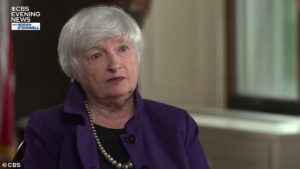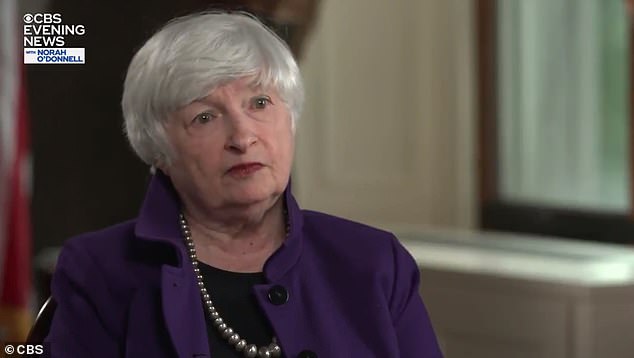
I’ve been following economic policy closely since Richard Nixon’s assault on economic freedom with his August 15, 1971, economywide price controls. While there have been ebbs and flows in economic freedom in the fifty years since then, I have never seen anything like the full court press against economic freedom exercised by President Biden and his administration. To the extent it succeeds, it will not only reduce our freedom but also slow the growth of our real income.
If you think Biden’s policies compare to Jimmy Carter’s, you would be wrong. Carter’s energy policies were horrendous. He continued Nixon’s and Ford’s price controls on oil and gasoline until he finally started to phase them out in his last year in office; he dictated minimum and maximum temperatures for buildings; and he set energy standards for appliances that have made them less useful and more expensive. In one of his worst hires, he appointed G. William Miller as chairman of the Federal Reserve and Miller went on to print more money and cause more inflation. But Carter was a leader in ending economic regulation of airlines, of trucking, and of railroads. Airline deregulation made airline travel cheaper and made it much easier for middle-class people to fly multiple times a year. Trucking and rail deregulation made those shipping modes more efficient and cheaper. And in 1979 he appointed Paul Volcker as fed chairman and Volcker went on to follow a semi-monetarist policy that, under President Reagan, brought inflation down to low single digits. Carter also signed a tax bill in 1978 that reduced the tax rate on long-term capital gains.
Nothing that the Biden administration has done or is proposing on economic policy is comparable to Carter’s accomplishments. On every front, Biden and his appointees are pushing for massively higher spending, taxes, and regulation. Moreover, simply looking at the budget numbers, scary as they are, understates the damage because of the particular way the proposed programs are structured. Many of the programs set up bad disincentives and also intrude in private decision making that has worked out fairly well.
These are the opening three paragraphs of David R. Henderson, “The Biden Assault on Economic Freedom and Prosperity,” Defining Ideas, October 21, 2021.
And note this on the proposal for reducing further people’s financial privacy:
Arguably the most intrusive regulation the Biden administration proposes is the one on people’s accounts in financial institutions. USA Today recently corrected an InfoWars exaggeration of the plan. The InfoWars headline: “Biden’s Treasury Dept. Declares IRS Will Monitor Transactions of ALL U.S. Accounts Over $600.” USA Today pointed out two mistakes. First, the Treasury can’t make such a move without Congress’s authorization. Second, writes Ella Lee of USA Today, “[E]ven if the proposal is adopted banks would not provide access to individual transactions, just the total amount flowing in and out of an account annually.” The correction is important but is it supposed to be comforting? Democrats announced that they would raise the threshold from $600 to $10,000. But you need only have an average of $834 a month flowing out of your account to trigger IRS surveillance. So the IRS would know more about the majority of account holders than they do now.
Recently, Norah O’Donnell of CBS News asked Treasury Secretary Janet Yellen about the proposal. Yellen claimed that it was to catch wealthy people who are massively evading taxes. Yellen gave an example of someone who reports income of $10,000 but has $3 million flowing out of his checking account. Said Yellen: “That tells the IRS that’s an individual you might audit.” And this has exactly what to do with people whose flow out of their bank account is $10,000? Yellen was widely regarded as a first-rate economist. Surely, she’s still enough of an economist to know the difference between $10,000 and $3 million. Her sticking to her guns on the surveillance proposal suggests something more sinister: that she wants to go after, not the just the high-rolling tax cheats, but also, say, the gardener who gets away with paying a few hundred dollars less in taxes in a year.
Read the whole thing.
I just noticed that this is my 4,000th post on EconLog.


READER COMMENTS
David Seltzer
Oct 22 2021 at 6:50pm
Yellen was regarded as a first rate economist; now supports state surveillance of individuals. As a trained economist, she must have read Hayek on her way to her PHD. Her actions demonstrate a comprise of principles no less than those of Arthur F Burns while serving in the Nixon administration as Fed chairman. Surly Yellen must understand the stark contrast between the benefits of limited government with the costs of central economic planning. There are, IMHO, more than subtle threats to individual freedom in the policies of Social Security, progressive taxation, and forced programs of income redistribution, caused by or correlated with continuing government growth.
Andrew_FL
Oct 23 2021 at 8:34am
Yellen received her PhD in 1971. From Yale. There’s almost zero chance she read Hayek.
David Seltzer
Oct 23 2021 at 11:01am
On second thought, you’re probably correct.
Grand Rapids Mike
Oct 23 2021 at 10:56pm
Yellen’s comment on Hayek, would be is Who is Hayek.
Matthias
Oct 22 2021 at 7:20pm
That showerhead regulation is pretty silly. (From the article, the US regulates how much water can flow out of your showerhead.)
I looked around the Internet a bit, the reporting on the change and its reversal seems to be mostly about making fun of Trump.
Nothing about customer surplus anywhere, nor presumption of freedom to decide. (If the government thinks people are using too much water, they should levy a tax on water or on heating water, not micromanage people’s water uses..)
Matthias
Oct 22 2021 at 7:21pm
P.S. It’s also telling that the showerhead regulation is a federal regulation. I don’t understand what the states (or even counties) can’t handle here?
Mark Brophy
Oct 23 2021 at 11:23am
Obama enacted a regulation that controls how much water flows out of your dishwasher. Trump repealed it and Biden is restoring it. Since it takes 140 minutes to wash your dishes, run it at night when right before you go to sleep.
BC
Oct 23 2021 at 12:50am
Let’s also remember that Biden-Yellen are, as far as I know, the first to collude with other governments against American taxpayers to fix minimum corporate tax rates worldwide, ironic considering that the Biden Administration also seems poised to upend decades of antitrust precedent. What would the Biden Administration think if Google and Apple similarly colluded to set minimum smartphone prices to prevent a “race to the bottom”?
Vivian Darkbloom
Oct 23 2021 at 5:46am
“”Yellen gave an example of someone who reports income of $10,000 but has $3 million flowing out of his checking account. Said Yellen: “That tells the IRS that’s an individual you might audit.””
It strikes me that Yellen has things exactly backwards. I can imagine a very large percentage of retired folks and unemployed have much more flowing *out of* their “bank accounts” than they report as income. It’s called “drawing down your savings”. A better idea to catch tax cheats would focus on the amount of income flowing *into* bank accounts compared with the amount of income reported. Even that has its problems—how to distinguish, for example, between (tax-free) transfers from related accounts compared with (taxable) transfers from third parties, etc.
Also, under the Bank Secrecy Act, US banks are already required to report “suspicious activity” to the government. Generally, this applies to amounts over $10,000. There are very few US banks who would risk severe sanctions by not reporting the activity Yellen uses as her example of “someone you might audit”.
https://www.occ.treas.gov/topics/supervision-and-examination/bank-operations/financial-crime/suspicious-activity-reports/index-suspicious-activity-reports.html
I may have opined here when Yellen was nominated Treasury Secretary that she was a good choice. I regret saying that. That said, I think Larry Summers bears a lot of responsibility for the naive idea that trillions of tax dollars can be collected to cover the current spending spree by enacting this type of legislation to enhance enforcement.
Vivian Darkbloom
Oct 23 2021 at 5:54am
Regarding Summers and his protegé Natasha Sarin, see, for example, here:
https://www.reuters.com/article/us-usa-treasury-tax-idUSKBN2B82JO
Zeke5123
Oct 24 2021 at 9:14am
It has shades of FACTA. The government imposes a massive compliance cost on banks (which the government does not bear) to generate allegedly large sums from tax cheats but the size of tax cheats is always smaller than projected.
Make no mistake banks will be forced to pass on these fees to customers. Granted a decent amount will be automated but there will be quality control etc.
Vivian Darkbloom
Oct 24 2021 at 11:10am
“It has shades of FACTA”. Since I”m a stickler for Facts, it has shades of FATCA.
Based on my experience of over 40 years as a tax lawyer, I’ve drawn the conclusion that the US (and other) governments have made the conscious decision to make deputy sheriffs of lawyers, accountants, enrolled agents, banks and, more recently, big tech. All have increasing responsibilty as unpaid investigators and informants and for enforcing government laws and regulations as de facto government agents. If something slips through, they are subject to huge financial penalties and loss of privileges (e.g., licenses). I spent more time the last few years of active practice working for the government than I did for my clients. As far as I know, economists, who are not subject to licensure or censure, have been spared this burden. You are correct that these costs are largely passed on.
The distinction between public and private actors is often not very distinct today. That’s also something to keep in mind when thinking of issues such as “free speech”.
Billy Kaubashine
Oct 23 2021 at 10:23am
The fact that the Left wants to go after $600 ……or $10,000 level tax cheats is evidence that they know there aren’t enough high earners to pay for everything they have in mind.
Neither the ‘Super-rich’ nor the ‘Working-rich’ are skimming cash to avoid taxes. That’s the domain of the lowest 2 income quintiles. This will drive a lot of cash into mattresses and safe-deposit boxes, and will surely raise less revenue than hoped for. Disintermediation, anyone???
steve
Oct 23 2021 at 5:20pm
The IRS already concentrates on low earners.In theory they could be aiming to go after the high-rolling tax cheats. In reality the GOP will continue to deny funding to the IRS so that you are correct, this will focus on more low income people.
https://www.foxbusiness.com/money/irs-audits-poor-taxpayers-easier
Steve
Zeke5123
Oct 24 2021 at 9:17am
I am not sure I understand your argument. Is it that the IRS has limited choice of who to audit and therefore they choose to audit low income individuals? That seems like a poor use of resources. Why trust such a group with more resources?
Mark Z
Oct 24 2021 at 11:54am
Right, if they’ve already reached the point where it’s more worth it to go after poor people at the margin, I don’t see why more resources would make them go after rich people.
Realistically, most rich people who pay little in taxes do so via legal tax avoidance rather than evasion, so giving the IRS more resources won’t affect them much.
Comments are closed.